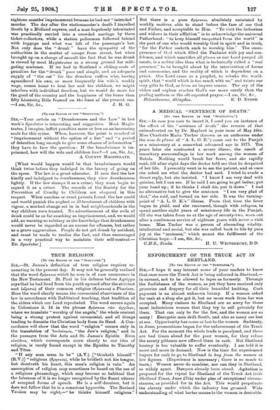TRUE RELIGION.
ere THE nDITOR OF THZ " SrgCTATOR.") SIR,—St. James's definition of true religion requires re- asserting in the present day. It may not be generally realised that the word Opiereeta which he uses is of rare occurrence in the New Testament. St. Paul in his defence before Agrippa says that he had lived from his youth upward after the strictest sect (a7peo-tv) of their common religion (OpicrKeta) a Pharisee. Here the word clearly means the ceremonial observance of the law in accordance with Rabbinical teaching, that tradition of the elders which our Lord reprobated. The word occurs again in Colossians ii. 18 in the phrase Bpiatcaa v anihow, where we translate "worship of the angels," the whole context being a strong protest against ceremonial, and all things tending to disunite the Christian body from its Head. A Con- cordance will show that the word "religion" occurs only in the translation of "the Jew's religion," and in the passages from the Acts and St. James's Epistle. Even eigrifiaa, which corresponds more closely to our idea of religion, is rarely found except in the Epistles to Timothy and Titus.
"If any man seem to be" (A.V.) [" thinketh himself" (R.V.)] "religions (Opeoluir), while he bridleth not his tongue, but deceiveth his heart, this man's religion is vain." An assumption of religion may sometimes be based on the use of a religious phraseology, which may become so habitual that the falseness of it is no longer recognised by the fluent utterer of accepted forms of speech. He is a self-deceiver, but it does not follow that he is a conscious hypocrite. The Revised Version may be right,—" he thinks himself religions." But there is a pure Opialcsw, absolutely untainted by worldly motives, able to stand before the face of our God and Father, and acceptable to Him. "To visit the fatherless and widows in their affliction" is to acknowledge the universal Fatherhood: "to keep himself unspotted from the world" is the part of one who would worship God in spirit and in truth, "for the Father seeketh such to worship him." The omni- presence of God which filled the Psalmist with joy and con- fidence, and which sanctifies all places as our Lord purged all meats, is a nobler idea than what is technically called a "real presence," to be brought about by the intervention of forms and ceremonies, and the reality of which is dependent on a priest. Our Lord came as a prophet, to rebuke the world- spirit, that "world which is too much with us," and taints our very gifts to God, as from an impure source. The cry of the widow and orphan reaches God's ear more surely than the pealing anthem or the oft-repeated prayer.—I am, Sir, &c.,






































 Previous page
Previous page